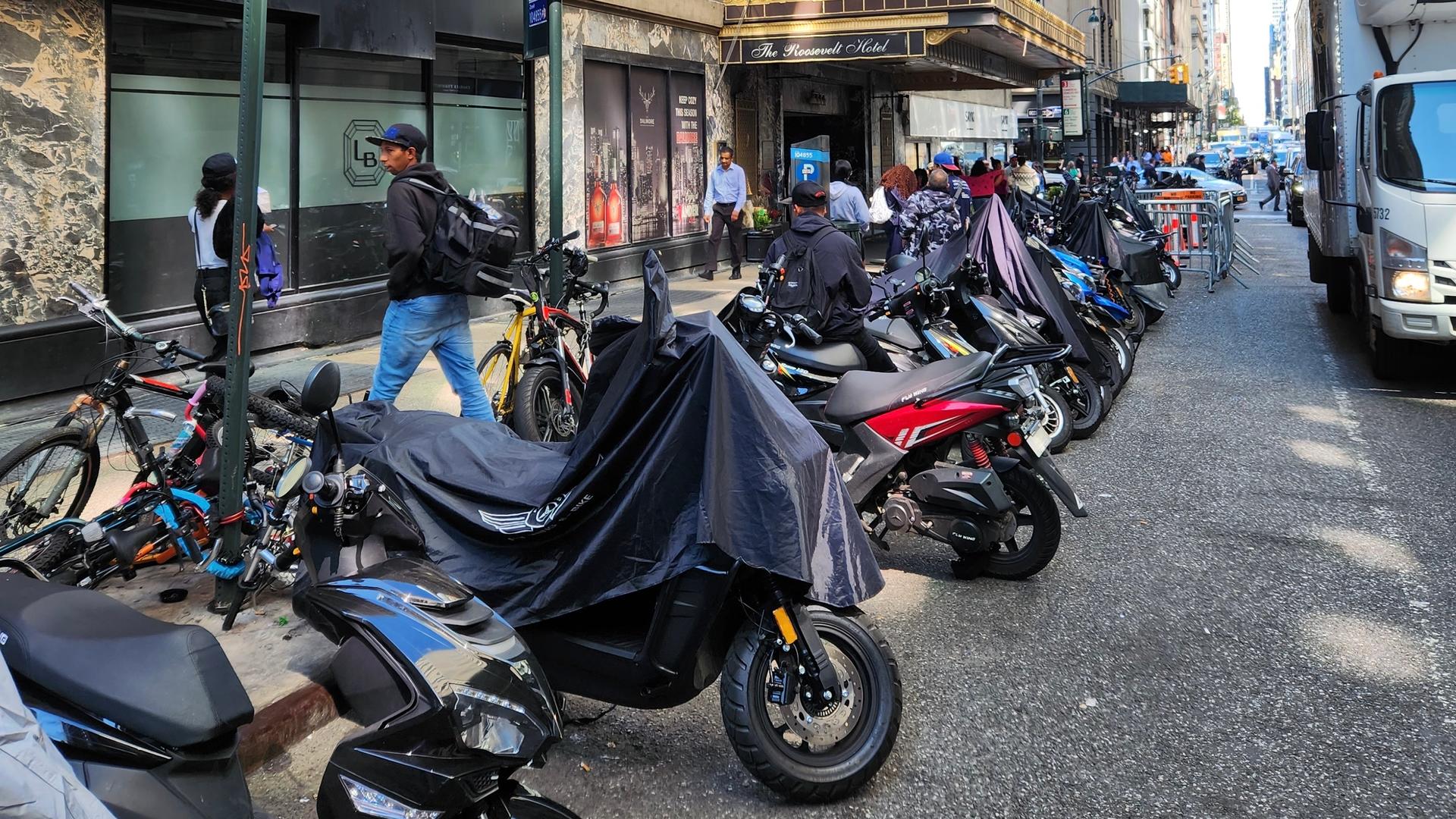A new underground gig economy is booming in New York City as migrants wait for work permits
Over the summer, Luis Vega, a 23-year-old migrant from Venezuela, spent weeks searching for a job in Manhattan. “I walked all over the city,” he said, “but I couldn’t find a single job because I don’t speak English and don’t have work authorization.”
Vega is one of the 110,000 migrants who have arrived in New York City in recent months, and he’s living in one of the shelters offered by the city’s government.
“I don’t want to be here forever,” he said. “I want to be able to live independently.”

After a month of unsuccessful job searching, Vega got in touch with a Colombian woman who sells access to accounts on Uber Eats. Then, he bought a secondhand moped for $500. This allowed him to start delivering food using the account of somebody else.
“I don’t know if this person is real or not, but it’s the only way I’m able to work,” Vega told The World.
For many migrants waiting for work permits, food delivery is the easiest way to make some money, Vega said, because the delivery apps don’t require much verification. “All you need is transportation and a smartphone.”
Many of the migrants who have recently arrived in the city have been bused from Republican states in the US south.
Mayor Eric Adams declared a state of emergency and has been aggressively requesting federal funding to help ease the costs. “I don’t see an ending to this. This issue will destroy New York City,” he said recently.
Adams says caring for migrants and asylum seekers could cost the city $12 billion over the next three years.
One of his most urgent requests was granted last week: The Biden administration announced that it would give nearly half a million Venezuelans residing in the US permission to work. About 60,000 have arrived in New York.
But the process of applying for the legal right to work might take months “because the US capacity to process applications is significantly backlogged, not just for Venezuelans, but across other applicants as well,” said Ariel Ruiz, a policy analyst with the Migration Policy Institute.
Ruiz says the Biden administration has some discretion to prioritize these applications and speed things up, but this would come at the cost of delaying other applications, “for example, for asylum and naturalization. There are almost 900,000 asylum applications backlogged in the system.”
In the meantime, migrants in New York who The World spoke with say they plan to keep working under the table.
Calixto Santiago, another Venezuelan delivery person in Manhattan, said his motorbike was taken by the police when he parked it briefly during a food delivery. The NYPD says it has seized more than 7,000 unregistered motorbikes this year.
Santiago said he was renting that moped by the week, and now he owes the total cost of it. So he’s returning to work delivering food, this time on a bike.

Undocumented and newly arrived migrants in New York City are also turning to construction jobs. Rafael Cárdenas, an immigrant from Ecuador, said he was recruited by two men outside of the Roosevelt Hotel in mid-Manhattan to work for $100 a day.
But after a week of working long hours under the baking summer sun, he never got his payment nor heard back from the people who hired him.
Wage theft is not uncommon for immigrants to experience, said Marcy Goldstein-Gelb, Co-Executive Director of the National Council for Occupational Safety and Health.

“Imagine you are new to this country, and a van comes and yells out how many people are needed,” Goldstein-Gelb said. “You’ve got minimal information about the job, certainly little to no training about the dangers. And then, once you’re at the job site, you have no idea where you are. You have no way to get back home without that construction van. You’re near power lines, dangerous equipment that may or may not be broken. You are so vulnerable.”
In many instances, she added, workers are injured, “and the employer will do whatever is necessary to avoid any responsibility, and many times don’t even pay what they promised.”
Cárdenas is now selling water bottles near Times Square so that he can raise money to buy a moped and start working as a delivery person.
The article you just read is free because dedicated readers and listeners like you chose to support our nonprofit newsroom. Our team works tirelessly to ensure you hear the latest in international, human-centered reporting every weekday. But our work would not be possible without you. We need your help.
Make a gift today to help us raise $67,000 by the end of the year and keep The World going strong. Every gift will get us one step closer to our goal!
